Unit1234知识点汇总
Unit1-3_重点内容总结
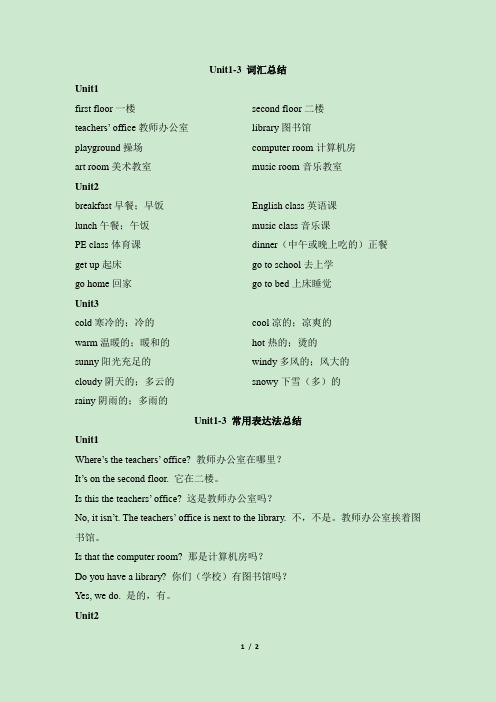
Unit1-3 词汇总结Unit1first floor一楼second floor二楼teachers’ office教师办公室library图书馆playground操场computer room计算机房art room美术教室music room音乐教室Unit2breakfast早餐;早饭English class英语课lunch午餐;午饭music class音乐课PE class体育课dinner(中午或晚上吃的)正餐get up起床go to school去上学go home回家go to bed上床睡觉Unit3cold寒冷的;冷的cool凉的;凉爽的warm温暖的;暖和的hot热的;烫的sunny阳光充足的windy多风的;风大的cloudy阴天的;多云的snowy下雪(多)的rainy阴雨的;多雨的Unit1-3 常用表达法总结Unit1Where’s the teachers’ office?教师办公室在哪里?It’s on the second floor.它在二楼。
Is this the teachers’ office? 这是教师办公室吗?No, it isn’t. The teachers’ office is next to the library.不,不是。
教师办公室挨着图书馆。
Is that the computer room? 那是计算机房吗?Do you have a library? 你们(学校)有图书馆吗?Yes, we do. 是的,有。
Unit2What time is it? 几点了?It’s 6 o’clock. It’s t ime for dinner. 六点了,该吃晚饭了。
Time to go home, kids. 该回家了,孩子们。
It’s time to get up.该起床了。
Unit3Can I go outside now? 现在我能出去吗?Yes, you can. /No, you can’t. 可以。
Unit 1-Unit4知识要点
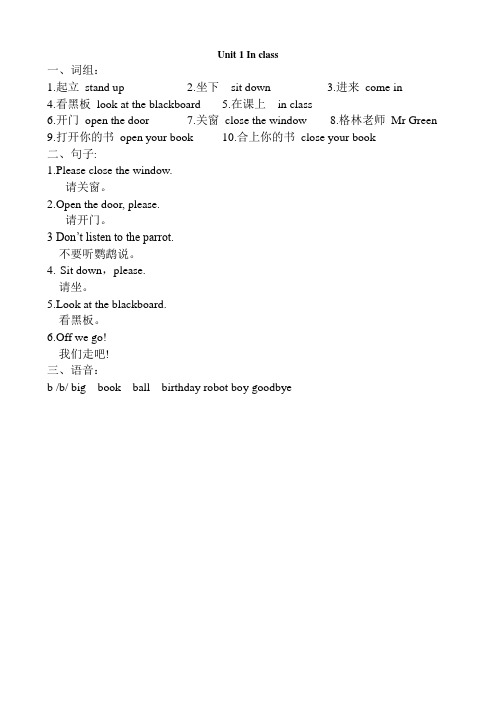
Unit 1 In class一、词组:1.起立stand up2.坐下sit down3.进来come in4.看黑板look at the blackboard5.在课上in class6.开门open the door7.关窗close the window8.格林老师Mr Green9.打开你的书open your book 10.合上你的书close your book二、句子:1.Please close the window.请关窗。
2.Open the door, please.请开门。
3 Don’t listen to the parrot.不要听鹦鹉说。
4.Sit down,please.请坐。
5.Look at the blackboard.看黑板。
6.Off we go!我们走吧!三、语音:b /b/ big book ball birthday robot boy goodbyeUnit 2 In the library一、词组:1.在图书馆in the library2.想要would like= want3.喝我的牛奶drink my milk4. 吃你的蛋糕eat your cake5.谢谢你thank you =thanks6.我的英语书my English book7.上下走walk up and down8.想要睡觉want to sleep9.在这里吃东西eat here 10.想要说话want to talk二、句子:1.Don’t shout in class.不要在课上大喊大叫。
2.Don’t eat in the library.不要在图书馆里吃东西。
3. Would you like a sweet?你想要一颗糖果吗?4. Is this your book?这是你的书吗?5. I want to sleep. = I would like to sleep .我想要睡觉。
1_3-4单元知识点
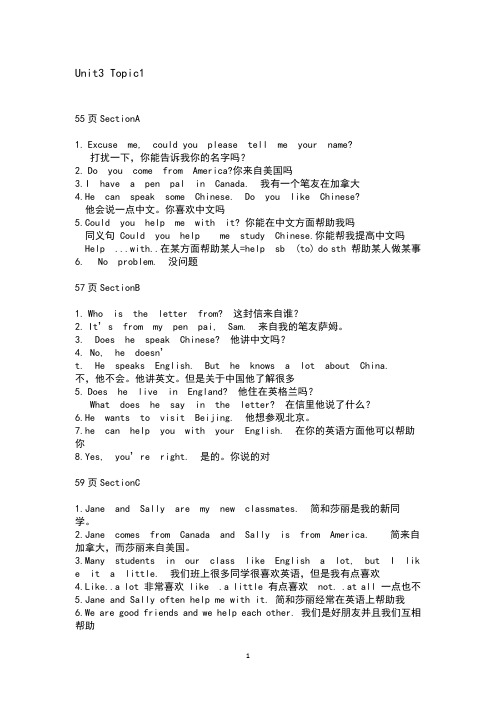
Unit3 Topic155页SectionA1.Excuse me, could you please tell me your name?打扰一下,你能告诉我你的名字吗?2.Do you come from America?你来自美国吗3.I have a pen pal in Canada. 我有一个笔友在加拿大4.He can speak some Chinese. Do you like Chinese?他会说一点中文。
你喜欢中文吗5.Could you help me with it? 你能在中文方面帮助我吗同义句 Could you help me study Chinese.你能帮我提高中文吗Help ...with..在某方面帮助某人=help sb (to) do sth 帮助某人做某事6.No problem. 没问题57页SectionB1.Who is the letter from? 这封信来自谁?2.It’s from my pen pai, Sam. 来自我的笔友萨姆。
3. Does he speak Chinese? 他讲中文吗?4. No, he doesn’t. He speaks English. But he knows a lot about China.不,他不会。
他讲英文。
但是关于中国他了解很多5.Does he live in England? 他住在英格兰吗?What does he say in the letter? 在信里他说了什么?6.He wants to visit Beijing. 他想参观北京。
7.he can help you with your English. 在你的英语方面他可以帮助你8.Yes, you’re right. 是的。
你说的对59页SectionC1.Jane and Sally are my new classmates. 简和莎丽是我的新同学。
初一英语1-3单元知识点
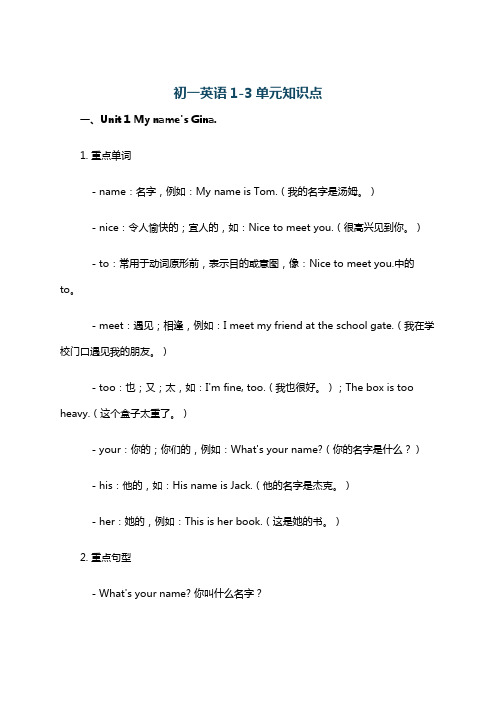
初一英语1-3单元知识点一、Unit 1 My name's Gina.1. 重点单词- name:名字,例如:My name is Tom.(我的名字是汤姆。
)- nice:令人愉快的;宜人的,如:Nice to meet you.(很高兴见到你。
) - to:常用于动词原形前,表示目的或意图,像:Nice to meet you.中的to。
- meet:遇见;相逢,例如:I meet my friend at the school gate.(我在学校门口遇见我的朋友。
)- too:也;又;太,如:I'm fine, too.(我也很好。
);The box is too heavy.(这个盒子太重了。
)- your:你的;你们的,例如:What's your name?(你的名字是什么?) - his:他的,如:His name is Jack.(他的名字是杰克。
)- her:她的,例如:This is her book.(这是她的书。
)2. 重点句型- What's your name? 你叫什么名字?- 回答:My name's...或者I'm...,例如:What's your name? My name's Gina.(你叫什么名字?我的名字是吉娜。
)- Nice to meet you. 很高兴见到你。
- 回答:Nice to meet you, too.(也很高兴见到你。
)- Are you...? 你是……吗?- 回答:Yes, I am. / No, I'm not.例如:Are you Tom? Yes, I am.(你是汤姆吗?是的,我是。
)3. 语法点- 形容词性物主代词:your(你的/你们的)、his(他的)、her(她的)。
形容词性物主代词后面要接名词,用来表示所属关系,如:your book(你的书),his pen(他的钢笔),her bag(她的包)。
英语unit1-unit3重点知识归纳总结
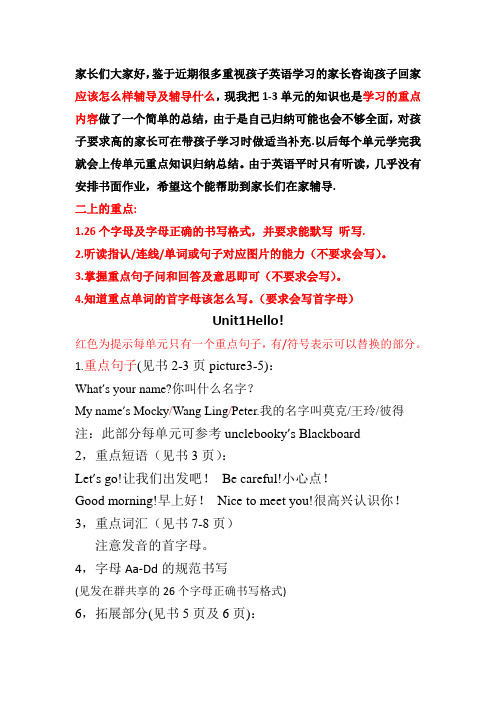
家长们大家好,鉴于近期很多重视孩子英语学习的家长咨询孩子回家应该怎么样辅导及辅导什么,现我把1-3单元的知识也是学习的重点内容做了一个简单的总结,由于是自己归纳可能也会不够全面,对孩子要求高的家长可在带孩子学习时做适当补充.以后每个单元学完我就会上传单元重点知识归纳总结。
由于英语平时只有听读,几乎没有安排书面作业,希望这个能帮助到家长们在家辅导.二上的重点:1.26个字母及字母正确的书写格式,并要求能默写听写.2.听读指认/连线/单词或句子对应图片的能力(不要求会写)。
3.掌握重点句子问和回答及意思即可(不要求会写)。
4.知道重点单词的首字母该怎么写。
(要求会写首字母)Unit1Hello!红色为提示每单元只有一个重点句子,有/符号表示可以替换的部分。
1.重点句子(见书2-3页picture3-5):What’s your name?你叫什么名字?My name’s Mocky/Wang Ling/Peter.我的名字叫莫克/王玲/彼得注:此部分每单元可参考unclebooky’s Blackboard2,重点短语(见书3页):Let’s go!让我们出发吧!Be careful!小心点!Good morning!早上好!Nice to meet you!很高兴认识你!3,重点词汇(见书7-8页)注意发音的首字母。
4,字母Aa-Dd的规范书写(见发在群共享的26个字母正确书写格式)6,拓展部分(见书5页及6页):Family name/second name/last name(姓) Given name/frist name(名) Let’s go together!(让我们一起走!)注:蓝色为补充部分,已要求孩子记下。
Unit 2 Mocky’s friends1.重点句子(见书14-15页picture1/5/6/10):This is danny Deer/Lulu leopard/Ken/Ann.这是小鹿丹妮/小豹路路/肯/安This isn’t Lulu.这不是路路注:此部分每单元可参考unclebooky’s Blackboard2,重点短语(见书3页):Come on!加油!/快点! What a lovely deer!多么可爱的小鹿啊!3,重点词汇(见书16/19/20页)注意发音的首字母。
unit1-4知识点归纳(纯中文)
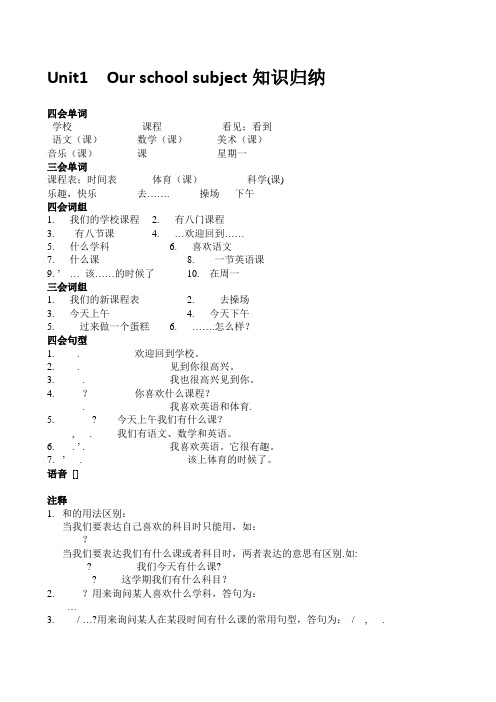
Unit1 Our school subject知识归纳四会单词学校课程看见;看到语文(课)数学(课)美术(课)音乐(课)课星期一三会单词课程表;时间表体育(课)科学(课)乐趣,快乐去……. 操场下午四会词组1. 我们的学校课程2. 有八门课程3. 有八节课4. …欢迎回到……5. 什么学科6. 喜欢语文7. 什么课8. 一节英语课9. ’ … 该……的时候了10. 在周一三会词组1. 我们的新课程表2. 去操场3. 今天上午4. 今天下午5. 过来做一个蛋糕6. …….怎么样?四会句型1.. 欢迎回到学校。
2.. 见到你很高兴。
3.. 我也很高兴见到你。
4.?你喜欢什么课程?. 我喜欢英语和体育.5.? 今天上午我们有什么课?, . 我们有语文、数学和英语。
6.. ’ .我喜欢英语。
它很有趣。
7.’ .该上体育的时候了。
语音[]注释1.和的用法区别:当我们要表达自己喜欢的科目时只能用,如:?当我们要表达我们有什么课或者科目时,两者表达的意思有区别.如: ? 我们今天有什么课?? 这学期我们有什么科目?2.?用来询问某人喜欢什么学科,答句为:…3./ …?用来询问某人在某段时间有什么课的常用句型,答句为:/ , .Unit 2 After school 知识点归纳四会单词三会单词去比赛今天什么时候每一天四会词组1. 星期几2. 在星期六3. 什么课4. 有语文和数学5. 起床6. 五点起床7. 星期天上午8. 星期五下午9. 在星期三早上10. 这个星期天三会词组1. 放学后2. 去打乒乓球3. 一场足球比赛4. 有足球比赛5. 一节游泳课6. 有游泳课7. 一节溜冰课8. 每天9 . 每节课10. 一周的每一天11. 组成一周12. 过来打乒乓球13. ’ 没有课14. 在六点15. 一个大汉堡包16. 一些三明治四会句型1.? 今天星期几?’ . 星期三。
(’+星期几)2.? 你周四上什么课?. 我上音乐和数学。
人教版英语七年级下册Units1-4知识点总结
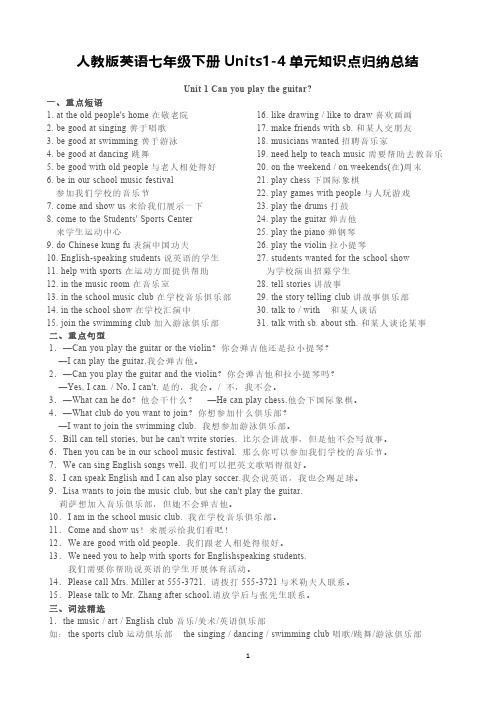
人教版英语七年级下册Units1-4单元知识点归纳总结Unit1Can you play the guitar?一、重点短语1.at the old people's home在敬老院2.be good at singing善于唱歌3.be good at swimming善于游泳4.be good at dancing跳舞5.be good with old people与老人相处得好6.be in our school music festival参加我们学校的音乐节e and show us来给我们展示一下e to the Students'Sports Center来学生运动中心9.do Chinese kung fu表演中国功夫10.English-speaking students说英语的学生11.help with sports在运动方面提供帮助12.in the music room在音乐室13.in the school music club在学校音乐俱乐部14.in the school show在学校汇演中15.join the swimming club加入游泳俱乐部16.like drawing/like to draw喜欢画画17.make friends with sb.和某人交朋友18.musicians wanted招聘音乐家19.need help to teach music需要帮助去教音乐20.on the weekend/on weekends(在)周末21.play chess下国际象棋22.play games with people与人玩游戏23.play the drums打鼓24.play the guitar弹吉他25.play the piano弹钢琴26.play the violin拉小提琴27.students wanted for the school show为学校演出招募学生28.tell stories讲故事29.the story telling club讲故事俱乐部30.talk to/with和某人谈话31.talk with sb.about sth.和某人谈论某事二、重点句型1.—Can you play the guitar or the violin?你会弹吉他还是拉小提琴?—I can play the guitar.我会弹吉他。
新版四年级上册Unit1--3知识归纳

Unit 1 My classroom一、单词classroom教室 window 窗户 blackboard黑板 light 电灯picture图画 door门 floor 地板 computer 计算机teacher’s desk 讲台 wall 墙 fan 扇子 near 距离近really 真的 TV 电视 clean 打扫 help 帮助二、语音a-e [ei] cake 蛋糕 face 脸 name 名字 make 制作a [æ] cat 猫 bag 包 hat 帽子 cap 鸭舌帽三、句型1. We have a new classroom. 我们有一个新教室。
2. Let’s go and see 让我们一起去看看吧。
3. What’s in the classroom? 教室里面有什么?One blackboard,one TV, many desks and chairs. 一块黑板一台电视,许多桌子和椅子。
4. Where is it? 它在哪儿?It’s near the window.它在窗户旁边。
5. Let’s clean the classroom.让我们一起打扫教室吧。
6. Let me clean the windows. 让我来擦窗户。
7. Look! This is the new classroom. The door is orange.看!这是新的教室。
门是橙色的。
四、短语1.地点类:on the wall在墙上 near the window在窗户旁in the classroom在教室 near the computer在计算机旁边2.动作类:clean the classroom打扫教室clean the desks and chairs 清洁桌椅clean the windows擦窗户 clean the teacher’s desk 清洁讲台clean the blackboard 擦黑板 sweep the floor扫地close the window 关窗 open the door开门(put up) the picture张帖图画(turn on) the light 开灯3.其他类: a new classroom一间新教室 excuse me 劳驾,对不起五、语法点1.where “哪里”,看到where 就要想到地点,方位词,例如on,in ,under, near等2.let’s = let us 让我们; let me 让我3.文化知识:想问别人问题,要先说“excuse me对不起,打扰一下。
Units1-4单元复习知识点人教版八年级英语上册

第一单元重点语法【一般过去时】1.概念:表示过去某个时间里发生的动作或状态;过去习惯性、经常性的动作、行为;过去主语所具备的能力和性格。
2.时间标志词1. yesterday, the day before yesterday2. 时间段+ago: three years ago, long ago…3. last: last day/ week/ year…4. in+过去年份: in 2015…5. just now 刚才【复合不定代词】复合不定代词是由some-,any-,no-,every-加上-one,-body,-thing等所组成的不定代词。
例如:Everyone wants to win.考向二:复合不定代词被形容词修饰,形容词后置例如:I have something interesting to tell you.考点三:辨析something/someone/somebody,anything/anyone/anybody,nothing/noone/nobody,everything/everyone/everybody1.something,someone,somebody通常用于肯定句中2.anything,anyone,anybody一般用于否定句、疑问句或条件状语从句中。
3. not....anything = nothing注意:1)在表示请求、邀请、提建议等带有委婉语气的疑问句,和希望得到对方肯定答复的疑问句,以及表示反问的问句中,也用something,someone,somebody等复合不定代词。
如:Would you like something to eat?2)当anything表示“任何事(物),无论何事(物)”,anyone,anybody表示“无论谁,任何人”等意义时,它们也可以用于肯定句中。
如:Anybody knows the answer.任何人都知道答案。
七年级英语(上)1到4单元知识点
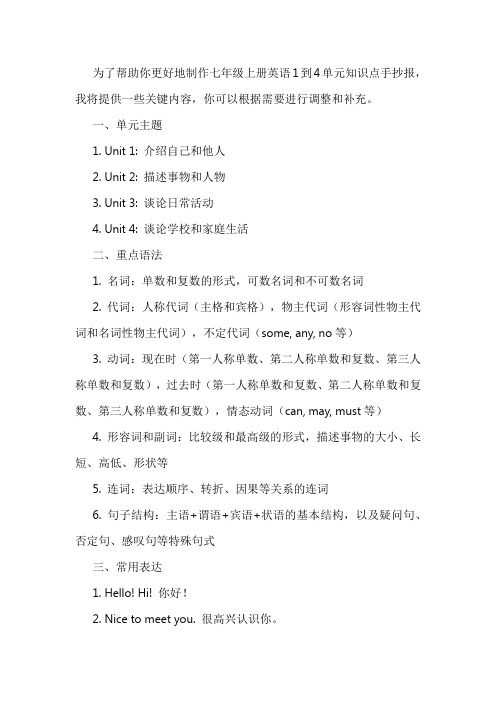
为了帮助你更好地制作七年级上册英语1到4单元知识点手抄报,我将提供一些关键内容,你可以根据需要进行调整和补充。
一、单元主题1. Unit 1: 介绍自己和他人2. Unit 2: 描述事物和人物3. Unit 3: 谈论日常活动4. Unit 4: 谈论学校和家庭生活二、重点语法1. 名词:单数和复数的形式,可数名词和不可数名词2. 代词:人称代词(主格和宾格),物主代词(形容词性物主代词和名词性物主代词),不定代词(some, any, no等)3. 动词:现在时(第一人称单数、第二人称单数和复数、第三人称单数和复数),过去时(第一人称单数和复数、第二人称单数和复数、第三人称单数和复数),情态动词(can, may, must等)4. 形容词和副词:比较级和最高级的形式,描述事物的大小、长短、高低、形状等5. 连词:表达顺序、转折、因果等关系的连词6. 句子结构:主语+谓语+宾语+状语的基本结构,以及疑问句、否定句、感叹句等特殊句式三、常用表达1. Hello! Hi! 你好!2. Nice to meet you. 很高兴认识你。
3. What's your name? 你叫什么名字?4. My name is ... 我叫……5. How are you? 你还好吗?6. I'm fine, thank you. 我很好,谢谢。
7. What's this? 这是什么?8. It's a/an ... 这是……9. Can you speak English? 你能说英语吗?10. Yes, I can. / No, I can't. 是的,我能。
/ 不,我不能。
11. What color is it? 它是什么颜色的?12. It's red/blue/yellow/green/black/white. 它是红色/蓝色/黄色/绿色/黑色/白色的。
Unit1-4知识点汇总(知识清单)-人教PEP版英语六年级下册
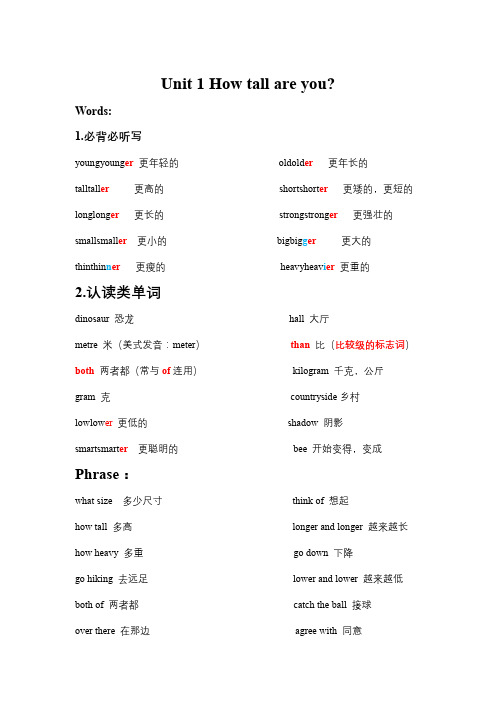
Unit 1 How tall are you?Words:1.必背必听写youngyoung er更年轻的oldold er 更年长的talltall er 更高的shortshort er 更矮的,更短的longlong er 更长的strongstrong er 更强壮的smallsmall er 更小的bigbig g er 更大的thinthin n er更瘦的heavyheav i er 更重的2.认读类单词dinosaur 恐龙hall 大厅metre 米(美式发音:meter)than比(比较级的标志词)both两者都(常与of连用)kilogram 千克,公斤gram 克countryside乡村lowlow er更低的shadow 阴影smartsmart er更聪明的bee 开始变得,变成Phrase:what size 多少尺寸think of 想起how tall 多高longer and longer 越来越长how heavy 多重go down 下降go hiking 去远足lower and lower 越来越低both of 两者都catch the ball 接球over there 在那边agree with 同意go on a trip 去旅行(=take a trip)have a try 试一试have a look 看一看Sentences:1.重点句型(问答句必考)①问身高:单数:How tall is it/he/she/人名?It/He/She is 1.65 metres.复数:How tall are you/they? I’m/They are 1.45 metres.②问体重:单数:How heavy is it/he/she/人名? It/He/She is 45 kilograms.复数:How heavy are you/they? I’m/They are 45 kilograms.③问鞋码数:What size are your shoes? Size 7.④问年龄:单数:How old is it/he/she/人名? It/He/She is 12years old.复数:How old are you? I’m/They are 12 years old.2.理解类句子That’s the tallest dinosaur in this hall. 那是这个厅里最高的恐龙。
Unit1---Unit4知识点总结

Unit1---Unit4知识点总结Unit 1知识点写出下列动词的过去式am/is are go do take see stay feed have feed read ride get forget stop drink find tell enjoy want decide write buy wait Section A写出下列词组1.呆在家里2.去纽约城3. 拜访我的叔叔4.去夏令营5.去爬山6.去海滩7.参观博物馆8.去度假9.和某人一起去10.买一些特别的东西11.见一些有趣的人12.好久不见13. 去一些有趣的地方14.拍相当多照片15.大多数时间16. 为….买…17.喂一些母鸡18.唯一的问题19.好像似乎做某事词语辨析1.不定代词的用法A.someone somebody something 用于肯定句中anyone anybody anything 用于否定句和一般英文句中no one nothing = not anyone/thingB. 形容词修饰不定代词要后置something interestingC. 不定代词做主语谓语动词用单数重点句型:1.Where did you/he/she/they go on vacation?I/She/He/They……..2.Did you buy anything special?Yes, I bought something for my fatherNo, I bought nothing.3.Everything tasted really good.4.Everything was excellent.SectionB重点词组1.到达某地(arrive/get/reach)2.决定做某事3.感觉像4.在过去5.喜欢在城镇周围散步6.多么与众不同的一天啊7.走上山顶8. 开始下雨9.由于坏天气10.足够的钱重点句型1.I arrived in Penang in Malaysia this moring with my family Arrive in(大)/at(小)get to reach + 地点2.I felk like I was a bird.feel like +doing 喜欢做某事3.I wonder what life was like here in the past4.I really enjoyed walking around the town.Enjoy doing sth5.What a difference a day makes!What +名词+主语+其他!How+ 形容词+主语+其他!6.It started raining a little!start to do/ doing7.We waited over an hour for the rain because there were too manypeople. too many +名词复数too much +不可数名词much too +形容词8.It was raining really hard/heavily!9.Because of the bad weatherBecause I was so hungry!Because of +名词短语Because +句子10. We didn’t bring enough money.Enough+名词形容词+enough ( cold enough)10.a nother two hours (2e)11.k eep doing sthUnit 2 知识点Section A词组:1、帮忙做家务2、去看电影3、读英语书4、用因特网5、去购物6、至少一周一次7、两周三次 8、多久一次9、在周末 10、上钢琴课11、熬夜 12、几乎从不13、吃健康的早餐句型1、What do you usually do on weekends?2、I always exercise.3、What does she usually do after school?4、She sometimes goes shopping.5、How often do you go to the movies?6、I go to the movies maybe once a month.7、How often does he watch TV?8、He hardly ever watches TV.9、Do you read English books?10、I never use the Internet.11、He helps with housework three or four times a week.Section B词组:1、对我的健康有益2、有好习惯3、多少小时4、吃垃圾食品5、玩电脑游戏6、去乡村野营7、15%的学生 8、一周一他到六次9、一点也不 10、至少一周三四次11、问题的答案 12、放松的最好方法13、去看牙医 14 去上网句型及知识点:1、How many hours do you sleep every night?2、My mother wants me to drink it.3、She says it’s good for my health.4、The other ten percent use it at least three or four timesa week.5、The answers to our questions about watching television wereinteresting.6、Although many students like to watch sports, g ame shows arethe most popular.7、It’s good to relax by using the Internet or watchinggameshows, but we think the best way to relax is through exercise.Unit3 知识点一.形容词比较级的规则变化规律:1.一般形容词直接加-er如:shorter2. 以 e 结尾的形容词直接加-r如:nice-nicer,late-later3. 单个辅音字母结尾的重读闭音节的形容词要双写词尾字母;如:fat-fatter,thin-thinner4. 以y 结尾的形容词要把y 改为i,再加-er; 如:heavy-heavier, funny-funnier5多音节词、部分双音节词词前加more; 如:athletic-more athletic, outgoing-more outgoing二:不规则变化good / well -betterbad / badly / ill -worsemany / much -morelittle -lessfar -farther / further三:词组SectionA1.我的头发比她的长(2种)2.2.那是丽莎,不是吗?3.also的用法4.跑的快,跑的比我快5.跳得高6.工作的和tina一样努力7.起床起得早8.歌唱比赛9.哪一个是丽萨?10.短头发的哪一个11.一些新的事情12.玩的开心13.告诉某人做某事、告诉某人不要做某事14.两年前1.I'm more outgoing than my sister2.She works as hard as him.3.The most important thing is to learn something new.4.Who’s smarter ,your mother or your father?5.She also sings more loudly than tara.6.She is also a teacher.SectionB15.在某方面有才华(3种)16.和……一样17.与……不同18.关心某人19.使某人做某事20.对我来说交朋友不是容易的21.只要22.相同是没有必要的23.激发出我的所能24.我真的不在意我的朋友是否和我一样或者不同25.伸手帮你一把26.打动你的心27.事实上28.分享一切29.他总是在那里听我诉说30.和某人作比较31.和……相识32.与某人相处的好33.给我打电话5577678为了更多的信息1.Mary and her best friend are both tall.2.Mary and her best friend both like sports.3.Agood friend is like a mirror.4.I always get better grades than he does.Unit 4知识点一.写出下列单词的比较级和最高级形式:cheap new close shortbig funnyserious popular, outgoing creativeexpensive boring comfortablequickly cheaply carefullymany/much good/well bad/badlylittle二.(SectionA)1.找到并写出下列短语(1a-2c)最好的电影院最大的荧屏最好的音响离家最近最短的等待时间最受欢迎的最舒服的座位最好的服装店最好的电台最差的衣服最差的服务买衣服最便宜买票最快捷有最差的音乐播放最无聊的歌曲选择歌曲最仔细(2d)新到此处;欢迎来到;至今,最好的超市;最大的椅子;最新鲜的食物;在这附近;最新的一个;坐着最舒服2.重点句型It has……….It’s………你认为…怎么样?(2)Grammer Fous (SectionB)3.找到并写出下列短语(2d)1.擅长于…. 2.做….是怎么样的3.越来越流行 4. 类似的节目5.全世界/世界各处6.例如7.有相同特征8.尝试/尽力做某事9.寻找10.等等,诸如此类11.各种类型的12.由你决定13.在…中发挥作用14.取得非常好的奖励15.享受做… 16.表演者的生活17.被编造18.例如19.认真对待20.给人们提供一种21.使…实现4.重点句型It is + adj.+ to do sth《比较级+and+比较级》译为“越来越……”The earth is getting warmer and warmer.地球变得越来越暖和。
知识点总结(Unit1-3)(知识清单)人教精通版英语四年级上册

人教精通版五年级上册知识点总结(Unit1Unit3)一单词辨析Unit1:国家1.China【释义】n.中国2.America【释义】n.美国3.England【释义】n.英国4.Singapore【释义】n.新加坡5.Canada【释义】n.加拿大家庭成员及人物身份1.friends【释义】n.朋友2.boy【释义】n.男孩3.girl【释义】n.女孩4.brother【释义】n.兄弟5.sister【释义】n.姐妹职业1.teacher【释义】n.教师2.farmer【释义】n.农民3.postman【释义】n.邮递员4.doctor【释义】n.医生5.nurse【释义】n.护士6.driver【释义】n.司机;驾驶员Unit2基数词:1.one【释义】num.一2.two【释义】num.二3.three【释义】num.三4.four【释义】num.5.five【释义】num.五6.six【释义】num.六7.thirteen【释义】num.十三8.fourteen【释义】num.十四9.fifteen【释义】num.十五10.sixteen【释义】num.十六11.seventeen【释义】num.十七12.eighteen【释义】num.十八13.seven【释义】num.七14.eight【释义】num.八15.nineteen【释义】num.十九16.twenty【释义】num.二十17.nine【释义】num.九18.ten【释义】num.十Unit3:1.pineapple【释义】n.菠萝2.lemon【释义】n.柠檬3.pear【释义】n.梨4.apple【释义】n.苹果5.watermelon【释义】n.西瓜6.kiwi fruit【释义】n.猕猴桃7.orange【释义】n.橙子,橘子8.banana【释义】n.香蕉蔬菜:1.potato【释义】n.土豆;马铃薯2.tomato【释义】n.西红柿3.carrot【释义】n.胡萝卜4.cucumber【释义】n.黄瓜5.eggplant【释义】n.茄子6.green pepper【释义】n.青椒二句型应用1.【课文应用】This is my new friend.这是我的新朋友。
人教版新目标八年级英语上册1、2、3、4单元知识点总结
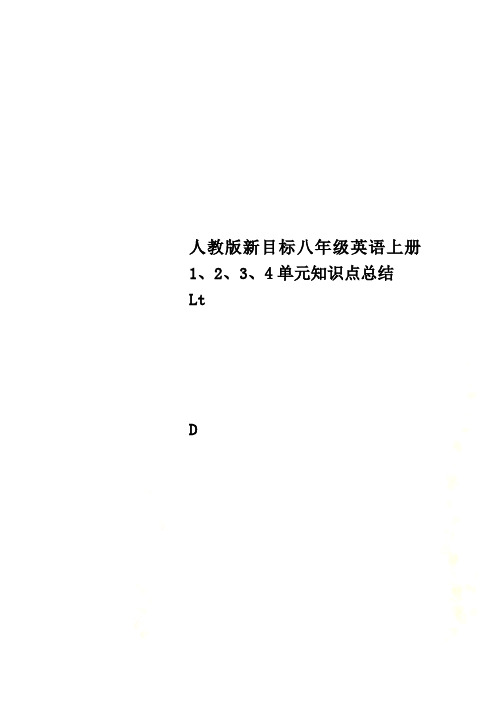
人教版新目标八年级英语上册1、2、3、4单元知识点总结LtD新目标八年级英语上册第一单元Unit 1.How often do you exercise?I. 重点短语归纳:on weekends 在周末1. go to the movies 去看电影2. look after=take care of 照顾、照看3. surf the internet 上网4. healthy lifestyle 健康的生活方式5. go skateboarding 去滑滑板watch TV看电视6. keep healthy=stay healthy = keep in good health 保持健康keep + 形容词表保持某种状态do some reading 阅读7. exercise= take/do (much) exercise=do sports锻炼8. eating habits 饮食习惯9. take more exercise 做更多的运动10. the same as 与什么相同11. once a month一月一次12. be different from 不同13. twice a week一周两次.three times a week一周三次14. make a difference to 对什么有影响As teachers, you must believe that you can make a difference to th e lives of your students. 身为教师,你们必须坚信你们能够影响学生的一生。
A false step will make a great difference to my future.错走一步对我的前程来说会产生很大影响。
15.how often 多久一次,询问动作发生的频率一般用once a week ,tw ice a month ,every day ,sometimes等答复。
Unit1-4知识点整合 人教版英语八年级上册

Unit 1一.固定搭配(需背诵)待在家________________去爬山________________拜访某人的叔叔________________参观博物馆________________去沙滩________________去夏令营________________度假________________拍了很多照片________________大部分时间________________在乡下________________为某人买某物________________一些有趣的地方________________到达________________决定做某事________________感觉像________________喜欢做某事________________开始做某事________________等待________________唯一的问题是在晚上除了读书外无事可做。
The only problem was that there was_______ ______ ______ in the evening but _______.大部分时间我只是待在家读书和放松。
I just stayed at home most of the time_____ ______ _____ _______.你为你的父母买了一些特别的东西了吗?___________________________________________?( )1.—When ______ you ______ the guitar?—Last Friday.A. do; buyB. does; buyC. / ; boughtD. did; buy( )2. Did you go shopping yesterday? _________.A Yes, I doB Yes, I didC Yes, I amD No, I couldn’tA Yes, I doB Yes, I didC Yes, I amD No, I couldn’t( )3. My brother ______ yesterday.A.buys me a new bikeB. bought a new bike to meC. bought a new bike meD. bought me a new bike给下列规则和不规则动词写过去式。
四年级下册英语1~3单元知识点
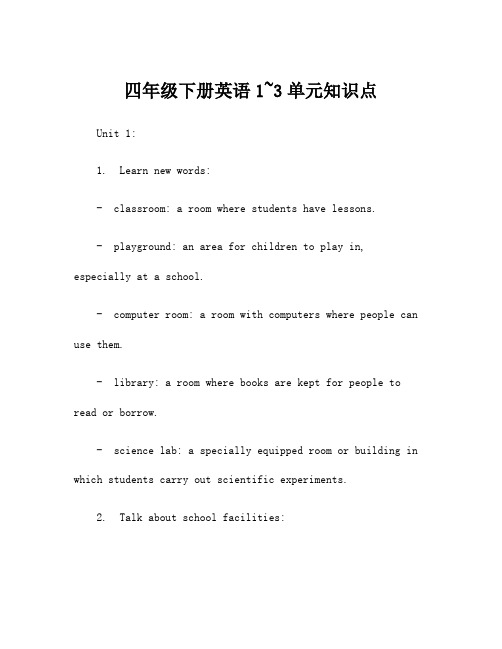
四年级下册英语1~3单元知识点Unit 1:1. Learn new words:- classroom: a room where students have lessons.- playground: an area for children to play in, especially at a school.- computer room: a room with computers where people can use them.- library: a room where books are kept for people to read or borrow.- science lab: a specially equipped room or building in which students carry out scientific experiments.2. Talk about school facilities:- My school has a big playground where we can play football and basketball.- We also have a computer room with many computers.- In addition, we have a science lab where we can do experiments.- Our library has many books that we can borrow.3. Use there is/there are:- There is a classroom in my school.- There are many students in my class.- There is a big playground in my school.- There are some trees and flowers in the playground.Unit 2:1. Learn new words:- musician: someone who plays a musical instrument or writes music.- dancer: someone who dances as a job or as a form of entertainment.- doctor: a person who is trained to treat people whoare ill.- cook: someone who prepares and cooks food as a job.- engineer: a person who designs, builds, or maintains engines, machines, or public works.2. Talk about jobs:- My father is a doctor. He helps sick people.- My mother is a musician. She plays the piano very well.- My uncle is an engineer. He builds bridges and roads.- My aunt is a cook. She cooks delicious food.3. Use can/can't:- I can play the guitar.- She can dance very well.- They can't sing.- He can ride a bike.Unit 3:1. Learn new words:- museum: a building where you can look at important objects connected with art, history, or science.- art gallery: a room or a building with a collection of art.- hospital: a large building where sick or injured people receive medical treatment.- supermarket: a large shop that sells food, drinks, and things for the home.- post office: a place where you can buy stamps, send letters, and use other postal services.2. Talk about places in town:- There is a museum in our town. It has many ancient artifacts.- We also have an art gallery. It has lots of beautiful paintings.- There is a big hospital near our school. It has many doctors and nurses.- We can buy food and drinks at the supermarket. It is very convenient.3. Use prepositions of place:- The supermarket is next to the post office.- The museum is opposite the art gallery.- The hospital is between the school and the library.- The post office is on the corner of the street.。
知识点归纳(Unit1~Unit4)
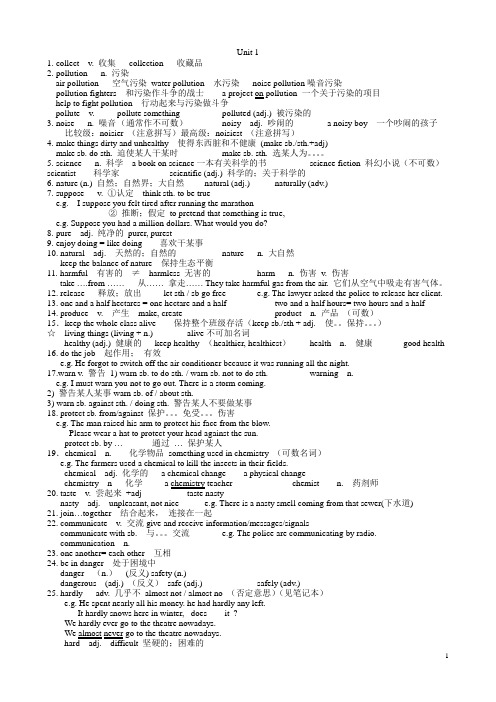
Unit 11. collect v. 收集collection 收藏品2. pollution n. 污染air pollution 空气污染water pollution 水污染noise pollution噪音污染pollution fighters 和污染作斗争的战士 a project on pollution 一个关于污染的项目help to fight pollution 行动起来与污染做斗争pollute v. pollute something polluted (adj.) 被污染的3. noise n. 噪音(通常作不可数)noisy adj. 吵闹的 a noisy boy 一个吵闹的孩子比较级:noisier (注意拼写)最高级:noisiest (注意拼写)4. make things dirty and unhealthy 使得东西脏和不健康(make sb./sth.+adj)make sb. do sth. 迫使某人干某时make sb. sth. 选某人为。
5. science n. 科学 a book on science一本有关科学的书science fiction 科幻小说(不可数)scientist 科学家scientific (adj.) 科学的;关于科学的6. nature (n.) 自然;自然界;大自然natural (adj.) naturally (adv.)7. suppose v.①认定think sth. to be truee.g. I suppose you felt tired after running the marathon②推断;假定to pretend that something is true,e.g. Suppose you had a million dollars. What would you do?8. pure adj. 纯净的purer, purest9. enjoy doing = like doing 喜欢干某事10. natural adj. 天然的;自然的nature n. 大自然keep the balance of nature 保持生态平衡11. harmful 有害的≠harmless 无害的harm n. 伤害v. 伤害take ….from ……从……拿走…… They take harmful gas from the air. 它们从空气中吸走有害气体。
九年级英语基础知识点梳理Unit1--4
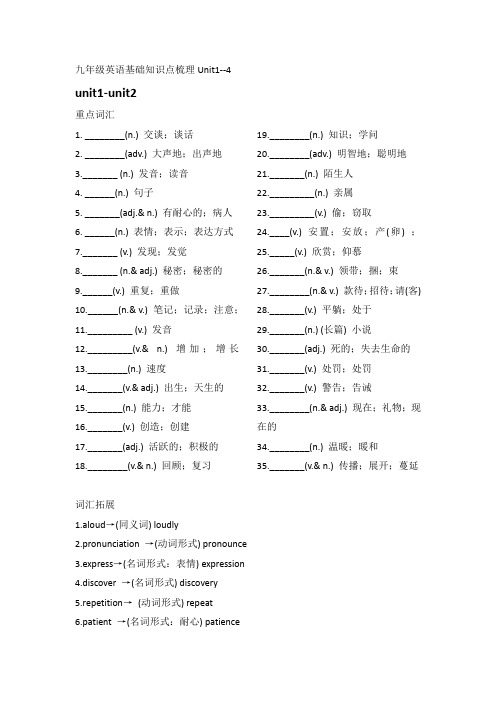
九年级英语基础知识点梳理Unit1--4 unit1-unit2重点词汇1. ________(n.) 交谈;谈话2. ________(adv.) 大声地;出声地3._______ (n.) 发音;读音4. ______(n.) 句子5. _______(adj.& n.) 有耐心的;病人6. ______(n.) 表情;表示;表达方式7._______ (v.) 发现;发觉8._______ (n.& adj.) 秘密;秘密的9.______(v.) 重复;重做10.______(n.& v.) 笔记;记录;注意;11._________ (v.) 发音12._________(v.& n.) 增加;增长13.________(n.) 速度14._______(v.& adj.) 出生;天生的15._______(n.) 能力;才能16._______(v.) 创造;创建17._______(adj.) 活跃的;积极的18.________(v.& n.) 回顾;复习19.________(n.) 知识;学问20.________(adv.) 明智地;聪明地21._______(n.) 陌生人22._________(n.) 亲属23._________(v.) 偷;窃取24.____(v.) 安置;安放;产(卵) ;25._____(v.) 欣赏;仰慕26._______(n.& v.) 领带;捆;束27.________(n.& v.) 款待;招待;请(客)28._______(v.) 平躺;处于29._______(n.) (长篇) 小说30._______(adj.) 死的;失去生命的31._______(v.) 处罚;处罚32._______(v.) 警告;告诫33.________(n.& adj.) 现在;礼物;现在的34.________(n.) 温暖;暖和35._______(v.& n.) 传播;展开;蔓延词汇拓展1.aloud→(同义词) loudly2.pronunciation →(动词形式) pronounce3.express→(名词形式:表情) expression4.discover →(名词形式) discovery5.repetition→(动词形式) repeat6.patient →(名词形式:耐心) patience7.physical→(物理) physics8.chemical→(化学) chemistry9.memorize→(名词形式:记忆) memory10.bear→(形容词形式:天生的) born11.able→(名词形式:能力;才能) ability12.creative→(动词形式:创造;创建) create13.active→(反义词) quiet→(名词形式:活动) activity14.review→(同义短语) go over15.know→(名词形式:知识) knowledge→(形容词形式:知识渊博的) knowledgeable16.wise →(副词形式) wisely17.strange →(指人的名词) strangery→(过去式) laid→(过去分词) laid19.tradition→(形容词形式:传统的) traditional20.haunt→(形容词形式:闹鬼的) haunted21.dead →(动词形式) die→(名词形式) death22.present→(近义词) gift23.warmth→(形容词形式) warm重点短语1.向老师寻求帮助:ask the teacher for help2.做笔记:take notes3.对……有耐心:be patient with4.(在词典、参考书中或通过电脑) 查阅;抬头看:look up5.大声阅读:read aloud6.逐字地:word by word7.……的秘密:the secret to8.记忆句式:memorize sentence patterns9.提高阅读速度:increase reading speed10.出错:make mistakes11.天生具有做某事的能力:be born with the ability to do sth.12.注意;关注:pay attention to13.把……和……连接起来:connect …with14.在……方面创建兴趣:create an interest in15.增加(体重) ;发胖:put on16.摆开;布置:lay out17.不招待就捣蛋:trick or treat18.最终成为;最后处于:end up重点句型1.—_____ do you learn English 你怎样学习英语?—I learn _____ studying_____ ______ ______.我通过小组合作来学习英语。
- 1、下载文档前请自行甄别文档内容的完整性,平台不提供额外的编辑、内容补充、找答案等附加服务。
- 2、"仅部分预览"的文档,不可在线预览部分如存在完整性等问题,可反馈申请退款(可完整预览的文档不适用该条件!)。
- 3、如文档侵犯您的权益,请联系客服反馈,我们会尽快为您处理(人工客服工作时间:9:00-18:30)。
Unit1 Where did you go on vacation?一.词型转换1. wonder(adj.)wonderful2. I (反身代词)myself3. you(反身代词)yourself4. yourself(复数)yourselves5. activity(复数)activities6. decide(n.)decision7. try(过去式.)tried8. bike(同义词)bicycle9.build(n.)building10. difference(adj.)different11. like(反义词) dislike二、短语归纳1.go on vacation去度假2.stay at home待在家里3.go to the mountains去爬山4.go to the beach去海滩5.visit museums 参观博物馆6.go to summer camp去参观夏令营7. so+ adj.+ that+ 从句如此……以至于……8.quite a few相当多9.study for the tests为考试而学习10.most of the time大部分时间11.taste + adj. 尝起来……taste good尝起来很好吃12.have a good time =enjoy oneself=have fun doing sth.玩得高兴13.because of the bad weather因为糟的天气because 句子14.something important重要的事15.of course当然16.arrive in+大地点/ arrive at+小地点到达某地17.decide to do sth. 决定去做某事18. tell sb. (not) to do sth. 告诉某人(不要)做某事19.feel like感觉像:feel like a bird 想要:feel like riding bikes20.go shopping去购物21.Why not do. sth.?为什么不做……呢?22.bring enough money 带足够的钱old enough 足够的大23.wait for sb.等候某人24.buy sth. for sb. / buy sb. sth.为某人买某物25.look+adj. 看起来……26.take photos照相28.nothing…but+ 动词原形除了……之外什么都没有29.go out with sb.跟某人出去30. keep a diary 记日记31.find out找出;查明e up出来33.seem+ adj. 看起来……Y ou seem happy today.seem to do sth. 似乎、好像做某事I seem to have a cold.It seems / seemed that+从句. 看起来好像…It seems that no one believe you.34.try doing sth. 尝试做某事35.try to do sth.尽力去做某事36.forget doing sth.忘记做过某事37.forget to do sth.忘记去做某事38.enjoy doing sth.喜欢做某事39.start doing sth.开始做某事40.stop doing sth.停止做某事41.in the past在过去42.walk around四处走走43.one bowl of rice 一碗米饭44.dislike doing sth. 不喜欢做某事45.keep doing sth. 继续做某事三、重点句子:1. Where did you go on vacation?你去哪儿度假的?2. Long time no see. 好久不见。
3. Did you go anywhere interesting?你去有趣的地方了吗?4. I just stayed at home most of the time to read and relax.大多数时间我只呆在家里看书和放松。
5. Everything was excellent.一切都很棒。
6. I bought something for my father,but nothing for myself. 我给我爸爸买了些东西,但是什么也没为自已买。
7.Why didn’t you buy anything for yourself?=Why not buy anything for yourself? 你为什么不为自已买点东西呢?8. How did you like it?你觉得它怎么样?9. I arrived at Penang in Malaysia this morning with my family.今天早晨我和家人到达马来西亚槟城。
10. For lunch, we had something very special.午饭我们吃了很特别的东西。
11. My father and I decided to go to Penang Hill today. 今天我和爸爸决定去槟城山。
12. And because of the bad weather , we couldn’t see anything below. 并且因为糟糕的天气,我们看不见下面的任何东西。
13.It’s my first time to visit the park,so everything is really interesting.这是我第一次到公园,因此一切对我都是很有趣的。
14.I wonder what life was like here in the past.我想知道过去这的生活是什么样的。
15.How was the food?食物怎么样?16.Still no one seemed to be bored.但仍然没有人觉得Unit 2 How often do you exercise?一.词型转换1. health(n.)----(adj.) healthy---- (反义词) unhealthy2. bo dy → (复数) bodies3. die → (-ing) dying4. write → (n.) writer5. keep → (过去式) kept6. though → (同义词) although,不能与but 连用。
二、短语归纳1. how often 多久一次2. on weekends 在周末3. go to the movies 去看电影4. help with housework 帮忙做家务5. hardly ever 几乎不;不曾6. the best way to do sth.做某事的最好方式7. at least 至少,不少于8. use the Internet 使用因特网9.go online 上网10. every day 每天11. once a day 每天一次12. one to three times a week一周一至三次13. twice a week 每周两次three or four times a week 一周三或四次14. be good/bad for your health对……有好处/坏处be good to sb.对……友好(和善)be good for ―对……有益‖be good at擅长,善于15. have dance and piano lessons上舞蹈和钢琴课16. go to the dentist 去看牙医17. more than 多于less than 少于18. help sb. with sth 帮助某人做某事19. play tennis 打网球20. junk food 垃圾食品21. drink milk 喝牛奶22. eat fruit 吃水果23. want sb. to do sth. 想要某人做某事24. go camping in the country 去乡下露营25. play sports 做运动26. such as 例如27. fifteen percent of our students 我们百分之十五的学生29. How many + 可数名词复数+ 一般疑问句有多少…..32 .be free 有空,闲着33.in one’s free time 在某人空闲的时间34.stay up late熬夜到很晚35.How come?怎么会?怎么回事?30.Old habits die hard.积习难改。
38. 主语+ find+ that+从句发现…39. It’s + adj.+ to do sth. 做某事是….的40.spend time with sb.和某人一起度过时光spend time (in) doing sth. 花时间做某事41. ask sb. about sth. 向某人询问某事42. by doing sth. 通过做某事43. What’s your favorite…..?你最喜欢的……是什么?44.How many times/hours …..?多少次/多少小时45.keep/be in good health处于健康的状态中46.keep+adj. keep healthy 保持健康三重点句子1. How often do you exercise?你多久锻炼一次I never exercise.(never表完全否定,可用于变完全否定句)2. —What do you usually do on weekends?—周末你通常干什么?—I usually play soccer.—我通常踢足球。
3. She says it’s good for my health.她说这对我的健康有好处。
4. How many hours do you sleep every night?你每天晚上睡多少个小时?5. And twenty percent do not exercise at all!并且百分之二十的学生根本不运动!6. The answers to our questions about watching television was also interesting.对于我们看电视这个问题的回答也趣。
7. It is good to relax by using the Internet or watching game shows, but we think the best way to relax is through exercise.通过上网或看娱乐节目放松是好的,但是我们认为最好的放松方式是通过锻炼。
